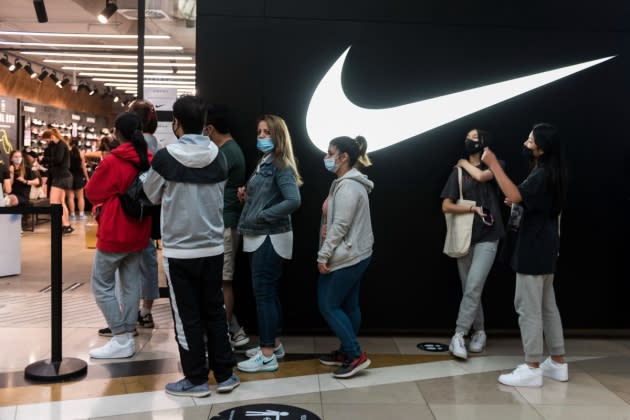Nike, Levi’s Earn Kudos for Wool Sourcing Practices

Levi Strauss & Co., Nike, Adidas and VF Corp. are strengthening their commitments to phase out mulesing.
Humane Society International (HIS) Australia launched the latest edition of its “Better Wool Guide” last week, adding 75 new brands for a total of 221 participants. The document highlights brands available to Australian consumers that have committed to removing mulesed wool from their supply chain, including those who have done so already.
More from Sourcing Journal
The Practical Reason Why Deion 'Prime Time' Sanders Returned to Nike
US Supreme Court Declines to Hear Nike vs. Adidas Patent Case
“The conversation on mulesed wool has shifted dramatically in recent years to one of condemnation, so it’s encouraging to see so many brands becoming more public about their opposition and supporting a kinder solution,” Georgie Dolphin, an animal welfare campaigner at HIS Australia, said in a statement. “Thanks to our Better Wool Guide, Australian shoppers who choose to buy wool products can more easily make a kinder choice for lambs at the checkout—whether they’re adding to their wardrobes or sourcing items for their home.”
Newcomers included Australian brands Koala, Spell, Afends and Zulu & Zephyr. They joined larger names like Target and H&M. Several big names, including the Timberland and North Face parent VF Corp., Levi Strauss & Co., Adidas and Nike, strengthened their commitments since HIS Australia’s last edition of the Better Wool Guide and now rank in the guide’s top tier.
The Better Wool Guide splits its brands and retailers into two tiers. The top tier includes those that are already 100 percent non-mulesed with verification partly or exclusively through a robust certification scheme, such as the Responsible Wool Standard or ZQ Merino, and those that have a time-bound commitment to be fully non-mulesed. The second tier covers those that have committed to phasing out mulesed wool, but without a time commitment, and those that have committed, but are relying on verification “through a less robust certification scheme.”
Performed on wrinkled lambs to prevent them from contracting flystrike—a painful disease caused by flies laying eggs in their skin folds—muleseing involves slicing strips of skin off their rears, often without pain relief. According to HIS Australia, more than 10 million Merino lambs are mulesed each year. Since New Zealand banned the practice in 2018, Australia is the only remaining country where mulesing still takes place.
“With so many brands ditching mulesed wool by 2025 or 2030, it is a strong market signal that the days of mulesing lambs are numbered,” Dolphin added. “It’s time to protect sheep from flystrike by breeding plain bodied flocks that don’t attract flies. And the sooner we see legislation in place to fast-track this progress, the better for both the welfare of lambs and the Australian wool industry’s reputation.”
The same day HIS Australia unveiled its latest Better Wool Guide last week, the Canadian women’s fashion brand Aritzia held its annual shareholders meeting. The day before, People for the Ethical Treatment of Animals (PETA), which owns stock in the company, announced its intent to pressure the company to ban all animal-derived materials from its products.
“There is nothing ‘responsible’ about mutilating animals without painkillers and violently killing them for their wool, feathers, or skin, despite Aritzia’s claims,” PETA executive vice president Tracy Reiman said in a statement. “PETA is calling on Aritzia to drop these meaningless labels and make the compassionate decision to get animal-derived materials off its store shelves.”
In its prepared shareholder question, PETA asserted that investigations into the farms and slaughterhouses linked to “responsible” suppliers had revealed “egregious cruelty” to animals, including geese that were “repeatedly hacked at” before being decapitated and lambs vomiting as workers knelt on them and sawed through their necks.
“The global vegan women’s fashion market is forecast to reach over $1 trillion by 2027,” the question read. “Members of Gen Z—Aritzia’s main consumer demographic—make up 23% of the global population, and their spending power is valued at $600 billion. They are conscientious consumers, want fashion that does more than simply look good, and are quick to turn their backs on companies that fund animal abuse. My question is this: When will Aritzia align its actions with its animal welfare claims and stop selling animal-derived materials?”
Through a spokesperson, Aritzia said it’s committed to responsible sourcing.
“At Aritzia, we are committed to sourcing all our materials responsibly, including animal-derived materials,” the spokesperson said in a statement to Sourcing Journal. “We follow the industry’s leading standards; standards established through multi stakeholder consultation and in line with the five freedoms framework. We also provide a number of options to clients who may prefer to purchase non-animal derived materials, such as our Primaloft filled outerwear or faux leather jackets and pants.
“We continue to take concerns about animal welfare in the fashion industry seriously and do our part in moving the global industry towards best practices,” the rep continued. “We are grateful to industry-related advocacy organizations who engage in a regular dialogue with us and we will continue to explore emerging standards of responsible sourcing as they become available.”
Editor’s note: This article was updated on July 10, 2023 with a statement from Aritzia.
